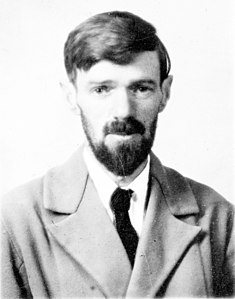Conceit
David Herbert Lawrence 1885 (Eastwood, Nottinghamshire) – 1930 (Vence)
It is conceit that kills us
and makes us cowards instead of gods.
Under the great Command: Know thy self, and that thou art mortal!
we have become fatally self-conscious, fatally self-important, fatally entangled in the Laocoön coils of our conceit.
Now we have to admit we can't know ourselves, we can only know about ourselves.
And I am not interested to know about myself any more,
I only entangle myself in the knowing.
Now let me be myself,
now let me be myself, and flicker forth,
now let me be myself, in the being, one of the gods.
Font size:
Submitted on May 13, 2011
Modified on March 05, 2023
- 30 sec read
- 116 Views
Quick analysis:
| Scheme | XA XX XXX XXA |
|---|---|
| Closest metre | Iambic heptameter |
| Characters | 539 |
| Words | 101 |
| Stanzas | 4 |
| Stanza Lengths | 2, 2, 3, 3 |
Translation
Find a translation for this poem in other languages:
Select another language:
- - Select -
- 简体中文 (Chinese - Simplified)
- 繁體中文 (Chinese - Traditional)
- Español (Spanish)
- Esperanto (Esperanto)
- 日本語 (Japanese)
- Português (Portuguese)
- Deutsch (German)
- العربية (Arabic)
- Français (French)
- Русский (Russian)
- ಕನ್ನಡ (Kannada)
- 한국어 (Korean)
- עברית (Hebrew)
- Gaeilge (Irish)
- Українська (Ukrainian)
- اردو (Urdu)
- Magyar (Hungarian)
- मानक हिन्दी (Hindi)
- Indonesia (Indonesian)
- Italiano (Italian)
- தமிழ் (Tamil)
- Türkçe (Turkish)
- తెలుగు (Telugu)
- ภาษาไทย (Thai)
- Tiếng Việt (Vietnamese)
- Čeština (Czech)
- Polski (Polish)
- Bahasa Indonesia (Indonesian)
- Românește (Romanian)
- Nederlands (Dutch)
- Ελληνικά (Greek)
- Latinum (Latin)
- Svenska (Swedish)
- Dansk (Danish)
- Suomi (Finnish)
- فارسی (Persian)
- ייִדיש (Yiddish)
- հայերեն (Armenian)
- Norsk (Norwegian)
- English (English)
Citation
Use the citation below to add this poem to your bibliography:
Style:MLAChicagoAPA
"Conceit" Poetry.com. STANDS4 LLC, 2024. Web. 19 Apr. 2024. <https://www.poetry.com/poem/7823/conceit>.



Discuss the poem Conceit with the community...
Report Comment
We're doing our best to make sure our content is useful, accurate and safe.
If by any chance you spot an inappropriate comment while navigating through our website please use this form to let us know, and we'll take care of it shortly.
Attachment
You need to be logged in to favorite.
Log In